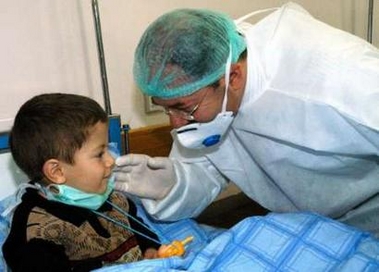Human bird flu cases reach Turkish capital (Reuters) Updated: 2006-01-09 08:59
Three Turks tested positive for a deadly strain of bird flu in the capital Ankara on Sunday, a new stage in the westward sweep of the disease from its east Asian origins towards major economic centres in Turkey and Europe. The first case of the virus jumping from birds to humans outside China and southeast Asia occurred last week in rural eastern Turkey, where three children from the same family died after contracting the highly potent H5N1 strain. As doctors confirmed that two children and a 60-year-old man were being treated in Ankara for the virus, Russia raised fears of the disease impacting Turkey's economy by warning its citizens against visiting the popular holiday destination. Doctors said the infected children, aged 5 and 2, came from Beypazari west of Ankara and had caught the virus after contact with dead wild birds. Their parents tested negative. Ankara is about 400 km (250 miles) east of Istanbul, Turkey's densely populated commercial and tourism hub, and from the continent of Europe. Officials said the culling of birds had begun in the Ankara districts hit by bird flu.
The state Anatolian news agency said a 5-year-old boy was admitted to hospital with suspected bird flu in Corum in central Turkey on Sunday. The agriculture ministry said bird flu had been detected among poultry in 15 different locations, including Istanbul. The children who died in Van last week almost certainly caught the virus directly from chickens, officials say. But world health authorities worry that human exposure to the bird flu could lead to the emergence of a mutation allowing easier transmission between humans -- and raising the prospect of a global pandemic. RUSSIAN WARNING A team of World Health Organisation doctors arrived in Van on Sunday evening after and said the Turkish government was behaving in a transparent way in fighting the disease. "The health ministry has a good understanding that this is both a local problem and also a global problem," one WHO official said in televised comments. His name was not given. Iran, which borders the Turkish region worst affected by the outbreak, closed one of its border crossings, forcing many Turks travelling there for this week's major Muslim holiday marking the Feast of the Sacrifice to return home, Anatolian said. Interfax news agency quoted Russia's chief state epidemiologist, Gennady Onishchenko, as saying: "I earnestly advise Russian citizens to refrain from travelling to Turkey, especially to the eastern province of Agri and the city of Dogubayazit, where the situation is particularly alarming." Russians flock to Turkey every year seeking sun and sand. They head mainly for Mediterranean and Aegean resorts many hundreds of km (miles) from Dogubayazit and Agri. Turkish Prime Minister Tayyip Erdogan has appealed to Turks to help in the mass cull aimed at stemming the advance of the virus and has promised adequate compensation to those affected. But in the Dogubayazit district hit by the virus, local people have accused the authorities of being slow to act. A Reuters reporter saw chickens still walking on the streets and some escaping as they were about to be carried in large bags to be buried alive in pits. The father of the three dead children in eastern Turkey, Zeki Kocyigit, 38, told Reuters they had not known bird flu was still a threat after authorities said they had successfully suppressed an outbreak among poultry in the west of the country. "Nobody warned us... We thought the bird flu had passed," he said, adding that it was the custom in rural Turkey for families to kill and eat sick birds. The virus spreads quickly among chickens, killing them in a day, and the best way to control it is immediately to slaughter all poultry in an affected area. This can be difficult in places where, as in eastern Turkey, people keep small backyard flocks. |
|
|
|
||
|
||

